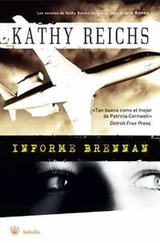Kathy Reichs - Spider Bones
Здесь есть возможность читать онлайн «Kathy Reichs - Spider Bones» весь текст электронной книги совершенно бесплатно (целиком полную версию без сокращений). В некоторых случаях можно слушать аудио, скачать через торрент в формате fb2 и присутствует краткое содержание. Жанр: Старинная литература, на английском языке. Описание произведения, (предисловие) а так же отзывы посетителей доступны на портале библиотеки ЛибКат.
- Название:Spider Bones
- Автор:
- Жанр:
- Год:неизвестен
- ISBN:нет данных
- Рейтинг книги:4 / 5. Голосов: 1
-
Избранное:Добавить в избранное
- Отзывы:
-
Ваша оценка:
- 80
- 1
- 2
- 3
- 4
- 5
Spider Bones: краткое содержание, описание и аннотация
Предлагаем к чтению аннотацию, описание, краткое содержание или предисловие (зависит от того, что написал сам автор книги «Spider Bones»). Если вы не нашли необходимую информацию о книге — напишите в комментариях, мы постараемся отыскать её.
Spider Bones — читать онлайн бесплатно полную книгу (весь текст) целиком
Ниже представлен текст книги, разбитый по страницам. Система сохранения места последней прочитанной страницы, позволяет с удобством читать онлайн бесплатно книгу «Spider Bones», без необходимости каждый раз заново искать на чём Вы остановились. Поставьте закладку, и сможете в любой момент перейти на страницу, на которой закончили чтение.
Интервал:
Закладка:
“Now what?” I asked when Katy had gone to the car for her luggage.
Danny looked at his watch.
“It’s Friday, now almost five. The lab will be emptier than a politician’s heart.”
I couldn’t help smiling at Danny’s metaphor.
“I’ve unearthed some info on Lowery. It’s not much. Forty-plus years is a long time. How about I brief you, then you and Katy relax over the weekend? Monday morning, we’ll meet at the CIL and start the analysis.”
While I was disappointed at the two-day delay, Danny was right. It was almost 10 p.m. East Coast time and I’d been up since 5 a.m. I’d slept little on the plane and was probably beyond my capacity for critical thought. More important, I didn’t want to leave Katy alone right away.
“Sounds like a plan,” I said.
Danny offered to carry my things from the car. I told him I could handle my own suitcase and laptop. He proceeded to get them anyway.
While Danny collected my belongings, I checked the refrigerator. It was packed. Soft drinks. Juice. Cheese. Yogurt. Hummus. Fruit and veggies. Bagels and cream cheese. Trays of prepackaged sushi.
I opened a few cupboards. Same deal.
The generosity was so Danny. Time and again, when I’d been down, he’d sent a silly gift to make me smile. When I’d been buoyant, pleased over some small victory or accomplishment, he’d sent a silly gift to enhance my happiness.
When Danny returned, I thanked him and offered to pay for the groceries. He asked for a brew but declined the dinero.
We argued. Danny finally provided a figure. Knowing it was low, I doubled the amount and wrote a check. Then we both settled into lounge chairs on the lanai.
“Spider’s story isn’t going to please his old man.”
Danny downed a slug of Corona and began.
“In December of nineteen sixty-seven, while stationed in Vietnam, Private John ‘Spider’ Lowery took unauthorized absence from his unit.”
“He just split?”
“Apparently. Six weeks later he was arrested by MPs at the home of a Vietnamese hooker on the outskirts of Saigon.”
“They were ranching?” I used the Vietnam-era term for shacking up.
Danny nodded. “Long story short, Lowery landed in the Long Binh jail, a military stockade on the road between Bien Hoa and Saigon. Eventually he was offered early release from the slammer if he rejoined his unit and went back to duty.”
“Was that standard practice?”
Another nod. “The war was in overdrive and the military needed as many bodies in action as possible, so if the offense was only UA the military would deal.”
1968. The Tet offensive. The Battle of Hue.
I’d been a kid at the time, but association with JPAC had familiarized me with details.
In January of 1968, hoping to spark a national uprising, the North Vietnamese Army, or NVA, and the National Front for the Liberation of South Vietnam, or Vietcong, broke the traditional Lunar New Year truce and launched the Tet offensive. Over 100 cities were attacked. So were Westmoreland’s headquarters and the U.S. embassy in Saigon.
During this urban offensive, the combined Vietcong and NVA troops captured Hue. The marines then counterattacked and took the former capital back, inch by bloody inch.
“Spider was released from Long Binh on January 23, 1968, and boarded a Huey to be returned to his unit,” Danny continued. “The passenger manifest listed four crew and Private Lowery. Shortly after takeoff, the Huey crashed and burned with the loss of all on board.
“Three crew members were recovered and identified the next day. Two warrant officers who were the pilot and copilot, and a sergeant who was the crew chief. A fourth badly burned body was discovered near the crash scene several days later. The body was wearing army fatigues but no insignia.”
“Wasn’t that odd?”
“Not given the fact that Lowery was fresh out of jail.” Danny took another pull on his beer. “The burned body was sent to the Tan Son Nhut mortuary, where forensic analysis showed that the victim fit Lowery’s profile, including age, sex, race, and height.”
“What about the fourth crew member?”
Danny shook his head. “A Spec 2 maintenance guy. They ruled him out. Not sure why.”
“Were his remains ever found?”
“I’ll have to ask.” More beer. “Following identification and processing, Lowery’s remains were shipped from Tan Son Nhut to Lumberton, North Carolina, for burial. End of story.”
“Apparently not,” I said.
“Apparently not.” Danny set down his empty bottle and rose. “You and Katy have a nice weekend.”
Despite Katy’s anguish, we did.

KATY WAS STILL SLEEPING WHEN I SET OUT MONDAY MORNING. Her day would be a repeat of both Saturday and Sunday. Reading by the ocean, later by the pool. A bit of snorkeling. A run on the beach. A long nap.
Hawaii hugs the equator, so island weather varies little. Sunny, highs in the eighties, maybe a blink-of-the-eye afternoon shower. In a word, perfect.
That descriptor does not apply to Honolulu’s rush-hour traffic.
Creep and lurch. Creep and lurch.
In addition to JPAC, Hickam Air Force Base is home to the Fifteenth Airlift Wing and sixty-seven partner units, including Pacific Air Forces Headquarters and the Hawaii Air National Guard. As with most military compounds, outsiders don’t just stroll in.
Queuing at the gate took a full ten minutes. When I finally reached the front of the line, an exceedingly spit-and-polished young man saluted me into an office manned by orange-vested security personnel.
Danny had left credentials. Once the car registration and safety-check paperwork were scanned, I was quickly cleared.
After skirting the military airport, I looped the traffic circle and drove past the air wing headquarters. The building’s bullet holes, still visible from the December 7, 1941, attack that pushed the U.S. into World War II, are pointed out to every first-time visitor to the base.
Eventually I made a right, wound past aircraft hangars, turned left, and pulled into a small parking lot. Building 45. The military coins such poetic names.
I dialed Danny on my mobile. He answered and said he’d be right out.
While waiting, I thought about the charge of those working inside the nondescript brown building. About the raison d’être of JPAC.
From 1959 until 1975, North Vietnam, supported by its Communist allies in the south, battled the government and armed forces of South Vietnam, supported by the United States and other members of SEATO, the Southeast Asia Treaty Organization. At its peak, the war kicked the crap out of Vietnam, Laos, and Cambodia.
Here’s how the conflict played out.
While the lightly armed Vietcong fought a hit-and-run guerrilla war, the NVA employed more conventional tactics, often committing large-sized units to battle. The U.S. relied on its usual trifecta of ground forces, heavy artillery, and gonzo airpower.
The human toll was enormous: 3 to 4 million Vietnamese from both sides; 1.5 to 2 million Laotians and Cambodians; 58,159 Americans.
Eighteen hundred of those Americans never came home and were not accounted for.
Thus the CIL, later JPAC.
Here come the acronyms.
The Central Identification Laboratory Thailand, CIL-THAI for short, was founded in 1973 to locate American military personnel missing in Southeast Asia. Three years later the lab was moved to Honolulu, its mission expanded. The Central Identification Laboratory Hawaii, CILHI, would henceforth search for, recover, and identify Americans missing from all previous conflicts. Today, in addition to Vietnam, that total includes 120 soldiers from the Cold War, 8,100 from the Korean War, and 78,000 from World War II.
Читать дальшеИнтервал:
Закладка:
Похожие книги на «Spider Bones»
Представляем Вашему вниманию похожие книги на «Spider Bones» списком для выбора. Мы отобрали схожую по названию и смыслу литературу в надежде предоставить читателям больше вариантов отыскать новые, интересные, ещё непрочитанные произведения.
Обсуждение, отзывы о книге «Spider Bones» и просто собственные мнения читателей. Оставьте ваши комментарии, напишите, что Вы думаете о произведении, его смысле или главных героях. Укажите что конкретно понравилось, а что нет, и почему Вы так считаете.










